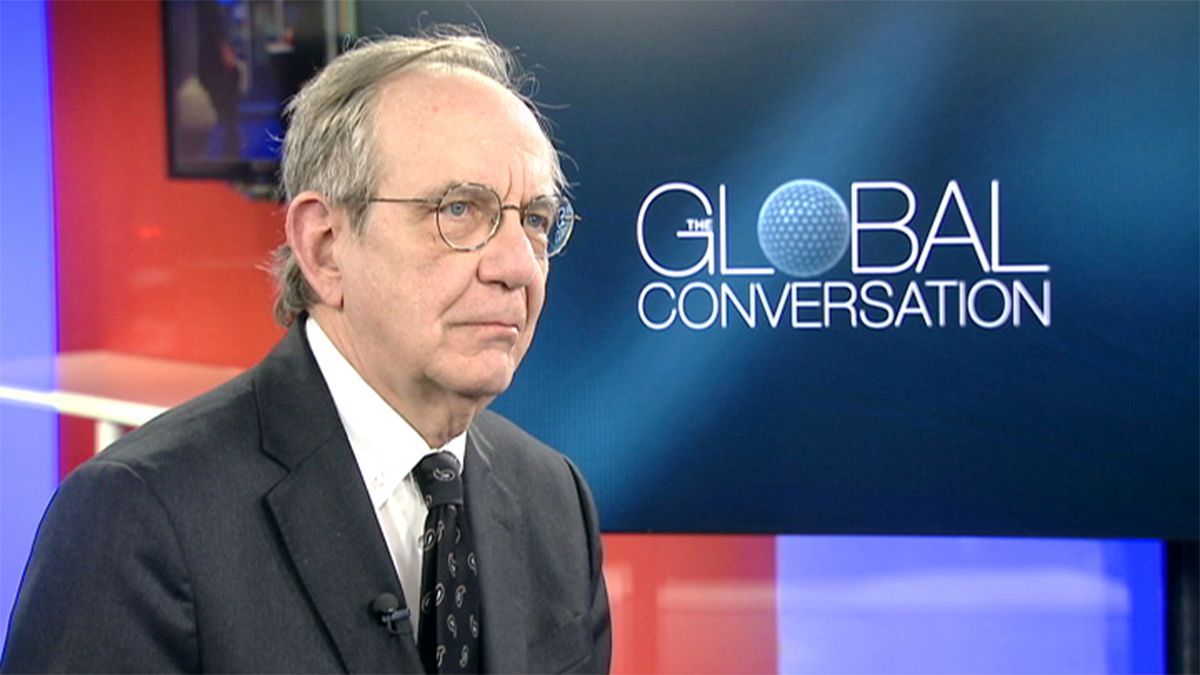Eurosceptic parties are continuing to score well across the EU.
Eurosceptic parties are continuing to score well across the EU. It is perhaps then not the best time to be calling for greater fiscal and political integration for the eurozone.
But that is exactly what Italy’s finance minister Pier Carlo Padoan says is needed, if Europe is to tackle the economic crises that it faces.
The former chief economist of The Organisation for Economic Co-operation and Development (OECD) spoke to euronews’ James Franey, in Brussels, for this edition of The Global Conversation.
Click on video above to watch full interview
James Franey, euronews:We’ve seen many eurozone bailouts over the past few years. What’s your outlook for the single currency today?
Pier Carlo Padoan, Italian Finance Minister: “The single currency is much stronger than it used to be three years ago since the Greek crisis broke out. We have made in Europe impressive progress in terms of institution-building and strengthening, especially in banking issues. But also looking more widely at growth and fiscal cooperation.”
euronews:Can it survive in its current form, though? What further reforms are needed in your view?
Pier Carlo Padoan: “First of all, we must complete banking union by providing banking union with a common deposit insurance scheme and a full-back stop to what is known as ‘resolution’ – that is to say to make banks safe if they are not doing well. But also to strengthen the growth drivers.
“And the growth drivers are a more ‘proactive’ fiscal policy, which should be much more growth friendly and there should be much more effort in structural reforms to raise growth potential in the European economy.”
**euronews:**If you look at at the growth numbers though for Italy over the past few years – you look at the real GDP, it’s been pretty much flat since the introduction of the euro. Do you think that the euro is in fact a ‘straight-jacket’ for growth?
Pier Carlo Padoan: “It is not if it is complemented by structural reforms, which we are doing in the country to raise growth potential, and also a link between the eurozone and the single market. In other words, I would favour more integration not just in the eurozone, but also in Europe in a wider sense.”
euronews:You once supported a eurozone finance minister. What do you mean by that? What sort of mandate would such a person have?
Pier Carlo Padoan: “Such a person would have to deal with common resources and what I call ‘European public goods’. One example: migration. Migration requires a European-wide strategy to deal not only with emergencies in migration flows, but also building conditions in the origin countries of migrants to have more developed economies, more job opportunities. So that the pressure to cross the sea and come to Europe is much easier (much less) than it is now.
“And also prepare Europe to welcome these migrants, which in the medium-term are a blessing for Europe because they raise growth opportunities for the whole of the European economy.”
Biography: Pier Carlo Padoan
- Pier Carlo Padoan, a trained economist, has been the Italian finance minister since February 2014
- He was previously the chief economist of the Paris-based OECD
- The 66-year-old also taught at the College of Europe, an elite university for aspiring EU officials, in Bruges and Warsaw
- Padoan has long been a vocal advocate of deeper political and fiscal union to fix the eurozone’s woes
euronews:Given the rise of euroscepticism in a lot of countries in the EU, is it really sensible to be proposing that we transfer more power to the European level. Do you not think that will merely fan the flames of euroscepticism in a way?
Pier Carlo Padoan: “It is tempting to blame it on Europe, but it is also important that European challenges are faced with European responses. And we see just one fact that over time, over the decades, Europe has grown to successive integration waves.
“There are a lot of benefits still to be reaped from greater integration, greater innovation, greater employment opportunities, including through migrants in the long-term. And this requires European, not national, responses.”
euronews:Where’s the evidence for that? If you look at the election results in some countries of late, where is the evidence that the public would support such things?
Pier Carlo Padoan: “What the polls and the voters all show that European citizens are dissatisfied with an economic model that has produced unemployment and recession, rather than growth. We need to turn that around.
“And we need to show that Europe can deliver more growth, more jobs, more welfare. It has been so in the past; we can also do it in the future – starting now.”
euronews:I just want to go back to the issue of fiscal union that you are going to be speaking about today. You are here in Brussels to give a speech at the ULB university.
The president of the Bundesbank, Mr Jens Weidmann, has been critical of that. He says that he sees ‘enormous obstacles’ to such a union ‘and no political will to remove them.’ What would you say to him?
Pier Carlo Padoan: “I would say that if you go back in the past, many times what has been achieved was deemed to be unachievable. Let me quote once again the single currency and the European Central Bank and all other European institutions. I am a strong believer that Europe must go forward, not backwards.
“If we go backward – and there are risks that we will do that – then this is going to produce a negative shock, not just to single institutions, but to the whole of the European construction. So we must go forward and gather consensus and political support for those ideas.”
euronews:Could you explain how the backstop that Italy has created to help its banking system will work? It is some five billion euros. Is that big enough?
Pier Carlo Padoan: “Well, first of all, this is a private sector endeavor. The private sector, the private banks, and insurance companies, Italians and other countries, have put together resources first of all to support recapitalisation operations in the Italian banking system. And also to provide resources to kick-start the NPL market, which has been stagnant in the country.”
euronews:Non-performing loans? Which is..?
Pier Carlo Padoan: “Non-performing loans, yes. Also the government has recently approved measures which will significantly speed up the time needed to recover bad loans, bringing it down from several years to only a few months. This is a very important change which will produce results, stronger results, as we move forward.”
euronews:But is this five billion euro backstop big enough, do you think?
Pier Carlo Padoan: “This is just a mechanism to start off. It has a leverage power. And as confidence grows, the market will generate prices that will make those resources available. And, of course, nothing prevents the private sector to decide to further provide resources with the funds. So to make it larger if needed.”
euronews:And if this strategy doesn’t work, what’s the Plan B for saving Italy’s banks?
Pier Carlo Padoan: “This strategy will work. And the Plan B – which is not a Plan B – is what is already going on. A major restructuring reform. The Populari banks – the mid-sized banks; the small banks – which are being deeply restructured. We will have strongers banks, but also fewer banks.
“So these banks will be able to raise capital on the markets, and provide funding to the economy. This is already ongoing.”
euronews:Just my final question really. Your country has a big problem with youth unemployment. Some 40 percent of young people are out of work. What would you say to those young people who are quite dissatisfied with the way the economy is going at the moment in Italy?
Pier Carlo Padoan: “What I would say to those young people is to look at the numbers. Since we have introduced our labour market reform, we have created almost 400,000 new jobs on a permanent basis, which means that not only that we have more jobs, but we have better quality jobs.
“There is a perspective for young people now. And, indeed, youth unemployment – yes, you are right – is very high, but it is beginning to decline. This wasn’t happening for many years. So we are at the beginning of a phase where we expect conditions for young people to find a job will improve. And also expectations will improve; confidence will improve.
“So young people will start, for instance, raising money to buy a house which is a sign of faith in the future.”



